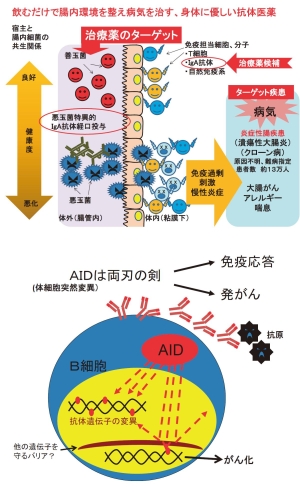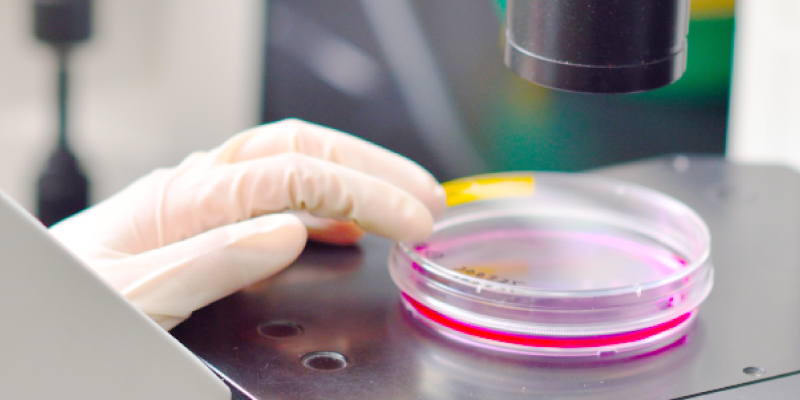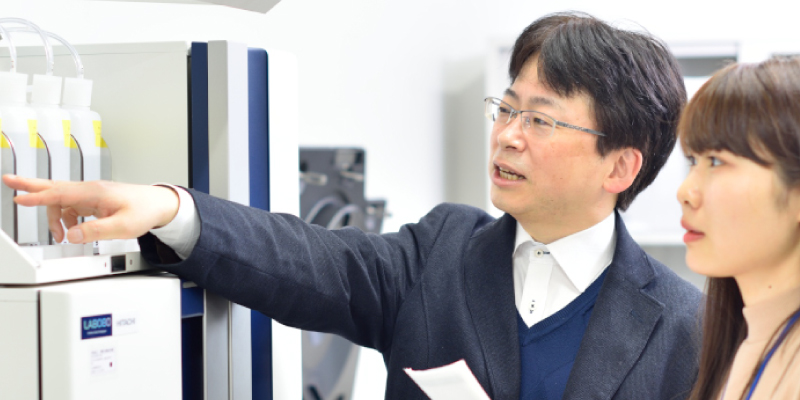バイオサイエンス学科
 新蔵 礼子(しんくら・れいこ)
新蔵 礼子(しんくら・れいこ)
Reiko Shinkura
専門分野/免疫学、分子生物学
職位:教授
学位:医学博士(京都大学)
- 京都大学大学院医学研究科外科系専攻博士課程修了
- 社会保険小倉記念病院麻酔科医員、京都大学医学部附属病院麻酔科医員、京都大学大学院医学研究科寄附講座免疫ゲノム医学講師、准教授を経て本学へ
研究テーマ
体細胞突然変異は、抗体を産生するB 細胞の免疫グロブリン遺伝子を多様化して、高親和性抗体を産生する機構です。抗体のクラススイッチ現象とともに感染から身体を守るのに重要な役割を担っています。しかし、体細胞突然変異はゲノムの安定性に対する大きな危険要素にもなり、もしこれがうまくコントロールされないと細胞のがん化を引き起こします。体細胞突然変異とクラススイッチには、activation-induced deaminase(AID)が必要です。体細胞突然変異はAIDによるDNA切断が引き金になって抗体遺伝子に変異が導入されますが、本来生物に備わっているDNA 修復機構を抑え、AIDが関わるとなぜ抗体遺伝子に高率に変異が入る(間違った修復が起こる)のか、その分子機構はまだはっきりわかっていません。抗体は十分量産生されるのに体細胞突然変異が起こらないマウス(AIDG23Sマウス)を作製して体細胞突然変異機構の研究をすすめています。
(1) 腸内細菌制御における体細胞突然変異の役割

体細胞突然変異が障害されたAIDG23Sマウスでは十分量の抗体が産生されますが、コレラ毒素をうまく中和できず生体防御には抗原に対する親和性を高めるfi ne tuningつまり体細胞突然変異が必要であることが確認できました。このマウスでは腸炎が起こることもわかりました。親和性の低いIgA 抗体では腸管内の常在細菌の侵入をコントロールできないためではないかと考えています。腸内細菌叢のバランスの崩れが多くの病気の原因になることが最近わかってきました。腸内細菌叢をコントロールするのにリンパ球が作る腸管IgA抗体がとても重要ですが、どのように腸内細菌に働きかけているかよくわかっていません。私たちはIgA抗体が腸内細菌にどう働くかに着目し、より良い腸内環境を作るための有用なIgA抗体を明らかにします。そして、そのIgA抗体を口から飲むことでいろいろな病気の治療や予防への応用を目指します。
(2) 体細胞突然変異機構の分子レベルでの解析
AID をノックアウトすると体細胞突然変異が起こりません。AIDがDNA に積極的に傷をつけることはわかってきましたが、すべての遺伝子に同等に起こるのではなく、なぜ抗体遺伝子に高率に変異が導入されるのか、AIDG23Sマウスと正常マウスを比較して明らかにしたいと考えています。分子レベルで体細胞突然変異を理解することはがんの制御にもつながる重要な課題です。
| 研究の応用領域 | 産官学連携で求めるパートナー |
|---|---|
| 医薬品、抗体医薬の開発 | 医薬品開発の関連企業、微生物を扱う企業、大学などの研究機関 |
Topics of research
The immune response has evolved to protect us from pathogenic infectious agents and toxic foreign substances. In the humoral immune response, antigen stimulation induces two distinct genetic alterations in the immunoglobulin (Ig) loci of mammalian B cells: somatic hypermutation (SHM) and class-switch recombination (CSR). SHM introduces point mutations at high frequency in the variable (V) region gene, followed by selection in germinal centers for high-affi nity antibody-producing cells against a given antigen. CSR is a region-specifi c recombination that replaces the heavy chain constant region (CH) gene from Cμ to other 'downstream' CH genes. As a result, B cells change their isotype from IgM to other isotypes such as IgG, IgE or IgA, diversifying their eff ector function without changing their antigen specificity.
Activation-induced cytidine deaminase (AID) is essential for both SHM and CSR. AID defi ciency causes a severe immune defi ciency in humans (Hyper IgM syndrome type II) due to the absence of IgH isotypes other than IgM and absence of SHM resulting in severe susceptibility to bacterial infection. AID is required to introduce DNA lesions into V and switch regions. Several important questions remain concerning how AID leads to DNA cleavage and how AID targets the mutator activities to Ig genes but not other genes. Indeed, AID has been demonstrated to be involved in tumor genesis such as B-cell lymphomas, including chromosomal translocations and mutations.
We generated knock-in mice, carrying a point mutation (G23S) in aicda (AIDG23S), which manifests defective SHM but relatively intact CSR. Study of this animal model leads us to understand the importance of mutated intestinal IgA antibody both in host defense and gut homeostasis.
Changing in the composition and abundance of gut microbiota can cause a variety of human diseases, including infl ammatory and metabolic diseases, cancer and autoimmune diseases. Through the study how IgA acts on luminal bacteria, we will identify the monoclonal dimeric IgA useful for gut homeostasis. Using an animal model, we will demonstrate the oral administration of such dimeric IgA can be eff ective to treat diseases caused by imbalanced gut microbiota.
主な業績論文等
- Wei M, Shinkura R, Doi Y, Maruya M, Fagarasan S and Honjo T. Mice carrying a knock-in mutation of Aicda resulting in a defect in somatic hypermuation have impaired gut homeostasis and compromised mucosal defense. Nat Immunol 12(3), 264-270, 2011.
- Shivarov V, Shinkura R and Honjo T. Dissociation of in vitro DNA deamination activity and physiological functions of AID mutants. Proc Natl Acad Sci U S A 105, 15866-15871, 2008.
- Shinkura R, Ito S, Begum NA, Nagaoka H, Muramatsu M, Kinoshita K, Sakakibara Y, Hijikata H and Honjo T. Separate domains of AID are required for somatic hypermutation and class-switch recombination. Nat Immunol 5(7), 707-712, 2004.
- Shinkura R, Tian M, Smith M, Chua K, Fujiwara Y and Alt FW. The infl uence of transcriptional orientation on endogenous switch region function. Nat Immunol 4(5), 435-441, 2003.
- Shinkura R, Kitada K, Matsuda F, Tashiro K, Ikuta K, Suzuki M, Kogishi K, Serikawa T and Honjo T. Alymphoplasia is caused by a point mutation in the mouse gene encoding Nf-kappa b-inducing kinase. Nat Genet 22(1), 74-77, 1999.






